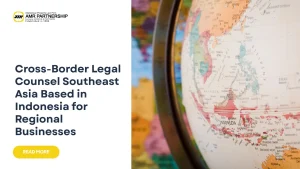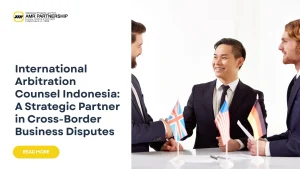
In recent years, the issue of intellectual property infringement has become more complex and urgent, especially for digital content creators. A high-profile case in 2025 has sparked global discussion on how creators use third-party intellectual property in their videos. This incident serves as a timely reminder for everyone engaged in creative industries to fully understand the laws around intellectual property and how they can avoid legal disputes. If you’re a content creator, marketer, or business owner, understanding your obligations and rights is essential. Visit amr.co.id to consult legal experts on intellectual property issues in Indonesia.
READ MORE: What the “Nuansa Bening” Case Can Teach You About the Role of a Copyright Infringement Lawyer
Understanding Intellectual Property Infringement
What Is Intellectual Property Infringement?
Intellectual property infringement refers to the unauthorized use of someone else’s protected work. This can include using copyrighted videos, brand logos, toy designs, music, or scripts without proper licensing or permission. Intellectual property (IP) includes trademarks, copyrights, patents, and trade secrets, each governed by specific laws and regulations.
The rise of user-generated content on social media platforms has blurred the lines between fair use and infringement. With millions of creators posting daily, the temptation to include recognizable products, characters, or themes is strong. However, even unintentional use of copyrighted content can result in serious consequences.
Types of IP Commonly Infringed by Content Creators
Copyrighted material, such as music, video clips, images, artwork, and scripts that are reused without proper licensing or attribution.
Trademarks, including recognizable logos, product names, or brand designs that are shown or referenced in content without permission.
Design patents, especially toy or product shapes and appearances that are visually distinctive and legally protected.
To avoid these infringements, it’s crucial to understand the scope of what counts as IP and when licensing is needed.
READ MORE: What Are Included in Intellectual Property? A Comprehensive List for Businesses and Creators
Legal Consequences of IP Infringement for Creators
Why Creators Are Being Sued
Legal action against creators is no longer rare. Even creators who produce content out of genuine appreciation for a product or brand are not exempt from liability. Courts and companies alike are reinforcing the message “if you use someone else’s intellectual property, especially for commercial gain, you must obtain appropriate permissions.”
Common legal consequences include:
- Cease and desist letters
- Monetary damages or fines
- Mandatory takedown of content
- Injunctions or restrictions from further use
When Content Becomes Commercial
Some creators believe that non-commercial content is exempt from scrutiny. However, the rise of influencer marketing, affiliate links, and sponsorships means that even seemingly casual content may be categorized as commercial. If your video includes product placements, brand mentions, or generates ad revenue, it can be classified as advertising.
In such cases, courts often rule in favor of the intellectual property holder, citing brand dilution or confusion among consumers.
READ MORE: What Are Considered Intellectual Property? Understand the Scope of IP Protection
Preventing Intellectual Property Infringement in Your Content
How to Stay Compliant
Here are some essential steps content creators can take to avoid legal trouble:
- Avoid using copyrighted characters or products without written permission.
- Create original content that does not replicate existing brands, logos, or products.
- Use royalty-free assets from reputable sources that explicitly grant commercial usage rights.
- Get proper licensing if using music, images, or product depictions in monetized content.
- Consult legal experts for pre-review of content suspected of containing IP issues.
It’s not enough to give credit or claim educational or entertainment intent. Legal permissions should be formal and verifiable. You can consult amr.co.id for expert advice on how to secure licensing and draft usage agreements.
READ MORE: Who Governs Intellectual Property Rights in Indonesia? Key Authorities, Regulations, and Their Roles
The Role of Legal Consultation in Protecting Creators
Why Legal Advice Is Crucial
Understanding intellectual property law can be overwhelming, especially for creators without legal backgrounds. Missteps, even small ones, can result in costly legal proceedings. That’s why consulting with experienced intellectual property professionals is not only smart, it’s essential.
At amr.co.id, our legal team provides specialized services to help creators, startups, and brands navigate the legal landscape. Whether you need help with pre-registration checks, licensing agreements, or defending against claims, AMR offers strategic support based on decades of experience.
READ MORE: When Was Intellectual Property Law Enacted in Indonesia? History and Development
Misconceptions About Fair Use and Public Domain
What Fair Use Doesn’t Cover
Many creators believe they can rely on “fair use” to include copyrighted materials in their videos. However, fair use is limited and applies only under specific conditions, such as commentary, criticism, or parody, and even then, it’s evaluated on a case-by-case basis.
Examples of fair use violations include:
- Uploading full scenes or music tracks without transformation
- Using toy characters in narratives without satire or critique
- Presenting branded products in monetized content without permission
Creators often mistakenly believe that editing or transforming the material slightly is enough to make it legal. That’s not the case. Courts assess whether the new work changes the original’s purpose and whether it harms the market for the original.
Public Domain Confusion
Similarly, content in the public domain is often misunderstood. Just because something is old or widely shared does not mean it’s free to use. Only works whose copyrights have expired or have been explicitly released into the public domain are fair game.
READ MORE: What Are the Forms of Intellectual Property You Should Know About in 2025?
How Brands Are Responding to Unlicensed Use
From Tolerance to Enforcement
Historically, many brands turned a blind eye to fan content, especially when it helped promote their products. However, as digital content increasingly influences public perception and purchasing behavior, companies are becoming stricter.
Some brands have even established internal monitoring systems or hired third-party agencies to track unauthorized usage. As a result, creators may find their content taken down without notice or face legal threats despite previous years of leniency.
This shift reflects a broader industry trend, intellectual property is not just about protection, it’s about control. Brands want to control how their IP is used, by whom, and in what context.
READ MORE: What Are the Seven Types of Intellectual Property Rights? A Full Breakdown
The Business Impact of IP Infringement on Creators
Why It’s More Than a Legal Issue
Besides legal liability, being involved in an IP dispute can damage a creator’s reputation and career. Sponsors may withdraw, followers may lose trust, and platforms could restrict account activity.
Worse, legal fees and settlement costs can bankrupt small creators. Some have had to shut down their channels, stop posting, or pivot away from content they love to make. That’s why proactive legal compliance is an investment, not an expense.
By working with IP professionals, creators can:
- Safeguard future projects
- Build brand collaborations on solid legal ground
- Avoid takedown notices and copyright strikes
If you’re a creator or brand facing similar risks, consider working with the team at amr.co.id. Their expertise in IP law ensures you can create without fear.
READ MORE: How Long Is Intellectual Property Valid For? Duration of Copyright, Patents, and Trademarks
Intellectual Property and the Future of Creative Content
What This Means for the Creator Economy
The growing number of legal disputes in the creator economy shows a turning point in how intellectual property is viewed and enforced. As creators increasingly function like media companies, they must also act like them, adhering to legal standards and protecting themselves through contracts, licenses, and expert counsel.
Intellectual property infringement is no longer a niche concern. It affects collaborations, sponsorships, and brand identity. Those who invest in understanding and complying with IP laws will thrive in the next phase of content creation.
Let amr.co.id help you build a legally sound foundation for your creative journey.
- Phone (Hunting): +62-21-29036668
- Fax: +62-21-29036672 to 75
- WhatsApp Customer Service: Click here to chat
- Instagram: @amrpartnership
- TikTok: @amr.partnership
- Facebook: Law Firm AMR Partnership
- Official Website: www.amr.co.id






